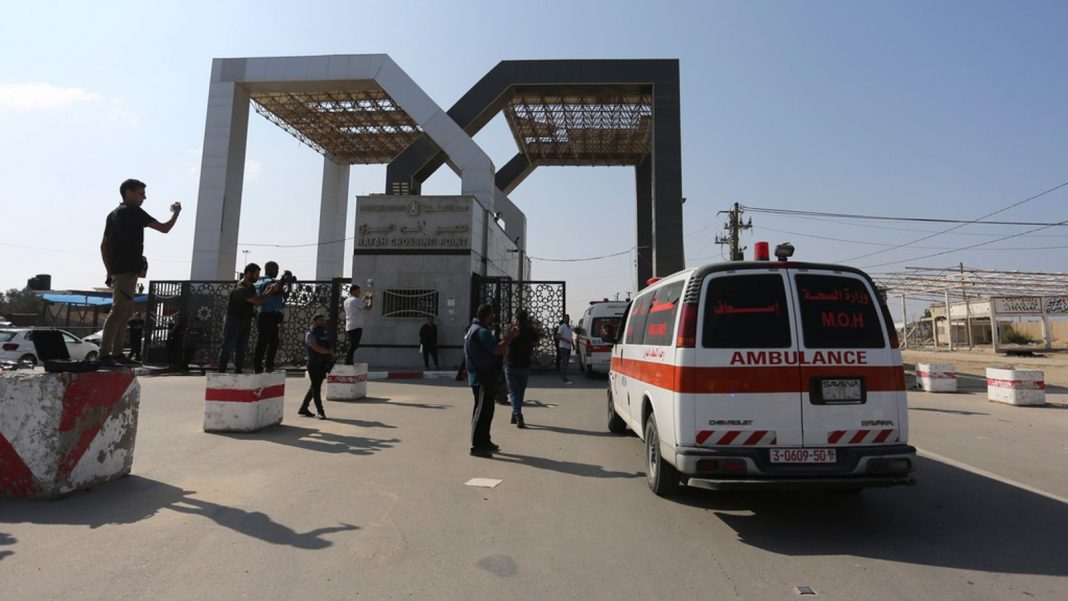It is billed as an unprecedented trip – the first of its kind for about a dozen UN ambassadors to witness the devastating effects of the war in Gaza.
It comes in the wake of the failure of the United Nations (UN) Security Council to agree on a ceasefire in Gaza after the United States used its veto and pushed through an emergency sale of more than $100m (£80m) worth of tank ammunition to Israel.
Diplomats are still scrambling to try to find some way to ease the growing humanitarian needs of those inside the war zone in the face of thousands of Palestinian casualties and abortive and deadly hostage rescue attempts.
Israel-Gaza latest: ‘What is coming is worse and greater,’ Hamas tells Israel
Israel has signalled its intention to continue fighting inside the Gaza Strip for months more if necessary to defeat Hamas.
The 193-member UN General Assembly has scheduled an emergency meeting on Tuesday to vote on a draft resolution demanding an immediate humanitarian ceasefire in Gaza.
But there are no vetoes in the General Assembly, and its decisions are not legally binding.
However, there’s likely to be more significant political fallout if it is widely agreed by most other countries.
In the face of mounting frustration over the inability of the world body to reach a consensus, the United Arab Emirates (UAE) has hastily arranged a field trip to the Egypt-Gaza border on Monday to try to show UN envoys first-hand the dire situation on the ground – and press further for the need for an immediate ceasefire.
People walk near tent camps where displaced Palestinians, who fled their houses due to Israeli strikes, have taken shelter in the border town of Rafah
The UAE is also hurriedly trying to redraw another resolution where it will demand the warring parties “allow the use of all land, sea and air routes to and throughout” Gaza for aid.
The resolution would also establish a UN-run aid monitoring mechanism in the Gaza Strip – at the moment Israel is doing all the checking – but it’s not clear when that resolution will be put to the vote.
The UN Security Council envoys have already heard secretary-general Antonio Guterres warn of a “humanitarian catastrophe” in Gaza, and he has said Gaza is at “breaking point”.
But even his dramatic attempt to force agreement by invoking Article 99 – the strongest diplomatic weapon at his disposal – has failed. He insisted on social media on Sunday however he would “not give up”.
But although invitations were extended to all 15 Security Council members, significantly the US representative is not on the trip.
The US use of its veto power to scupper the resolution calling for a ceasefire also saw the UK abstaining, while the remaining 13 other members all voted in favour.
Please use Chrome browser for a more accessible video player
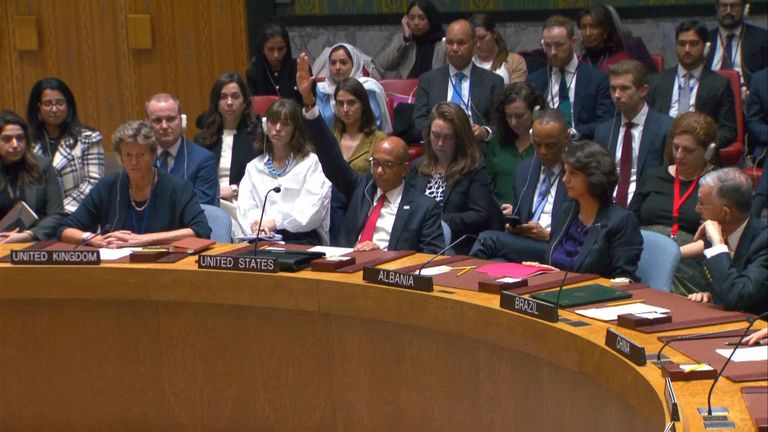
0:17
Moment US vetoes ceasefire resolution
The UAE’s UN ambassador, Lana Nusseibeh, said on the flight going over to the Rafah crossing that the aim “was to learn first-hand what is needed in terms of a humanitarian operation scale-up that meets the needs of the Palestinian people in Gaza”.
There’s been clear frustration among particularly the Arab countries – but also much of the rest of the world – at the inability of the UN to reach an agreement in the face of growing Palestinian civilian casualties and abortive and deadly Israeli military attempts to rescue hostages.
About 90 per cent of Gaza’s 2.3 million people are now displaced, and the UN has said there are no safe places in the besieged territory.
The US president’s decision to push through an emergency sale of more than $100m (£80m) worth of tank ammunition to Israel has further caused alarm and anger.
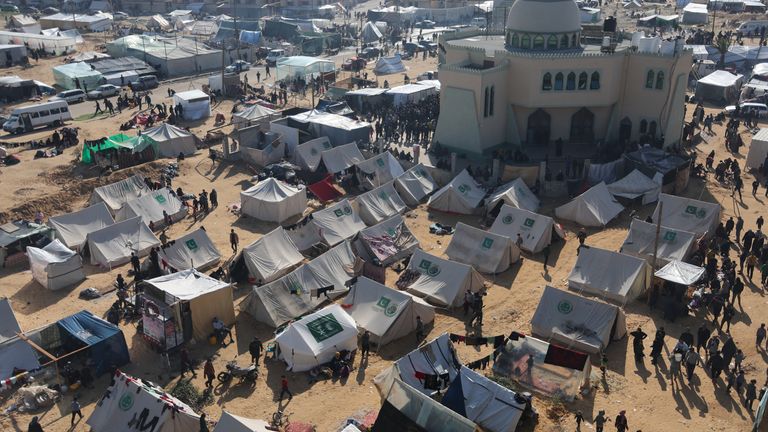
Displaced Palestinians, shelter in a camp in Rafah
Amnesty’s secretary general, Agnes Callamard, said the US position showed “callous disregard for civilian suffering” and described the use of the veto as “morally indefensible”.
The UAE deputy ambassador Mohamed Abushahab has warned the Security Council appears “untethered” from its mandate to ensure international peace and security.
And Human Rights Watch said the US position risked making them complicit in war crimes
But Israeli Prime Minister Benjamin Netanyahu personally thanked his US counterpart for standing with Israel and the Israeli defence minister Yoav Gallant echoed his sentiment by saying: “A ceasefire is handing a prize to Hamas, dismissing the hostages held in Gaza and signalling terror groups everywhere.”
However, the vote has left both the US and UK looking decidedly isolated on the world stage over the war in Gaza.
Please use Chrome browser for a more accessible video player
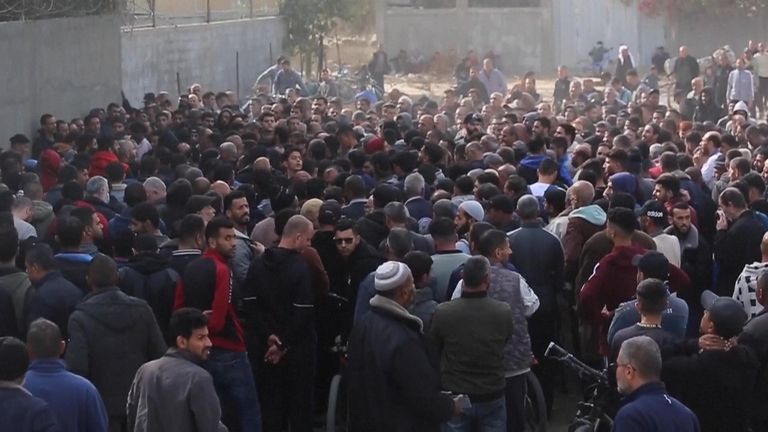
1:15
Hundreds of desperate Gazans queue hours for food
Russia’s UN Ambassador Vasily Nebenzia – who is on today’s trip – has repeatedly pushed for an immediate and unconditional ceasefire in Gaza and is now questioning Israel’s much-touted “right to defend itself” – a right, he insists “as an occupying force it does not have” quoting the UN International Court consultative ruling from 2004.
His deputy ambassador Dmitry Polyansky has accused the US of issuing a “death sentence to thousands if not tens of thousands more civilians in Palestine and Israel including women and children”.
Russia has close ties with key state and non-state actors including Iran, Hezbollah in Lebanon, Ansarallah in Yemen, the Islamic Resistance in Iraq, and Hamas itself.
Read more from Sky News:
Hamas outgunned and outnumbered – and some in Gaza blame leader
Israeli hostages released from Gaza describe ‘hell’ of Hamas captivity
It is not insignificant that Hamas has released Israeli captives with dual Russian citizenship.
And Russia’s seemingly growing status and influence within the Middle East seems to have led Mr Netanyahu to telephone the Russian leader personally (on Sunday) to express his displeasure over what he described as Moscow’s “anti-Israeli stance” at the United Nations.
The prime minister’s office said the talks went on for nearly an hour, and Mr Netanyahu expressed “robust disapproval” of what it called Russia’s “dangerous co-operation with Iran”.
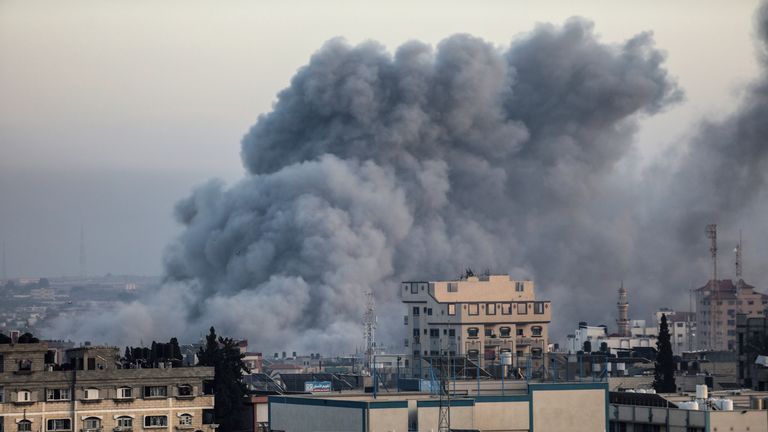
Thick smoke rises from buildings after an Israeli air strike on the city of Rafah in the southern Gaza Strip on 3 November. Pic: AP
It is the first talks between the two leaders since mid-October.
The Kremlin’s response was via the state-run TASS news agency: “Vladimir Putin reaffirmed the principal position of rejecting and condemning terrorism in all its forms.
“At the same time, it is extremely important that countering terrorist threats does not lead to such grave consequences for the civilian population.”
A delegation of Hamas representatives visited Moscow in late October and Kremlin officials expressed support then for the group, further alarming Israel.
The Russian Foreign minister has also said an international monitoring mission should visit Gaza to take stock of the humanitarian situation.
Please use Chrome browser for a more accessible video player
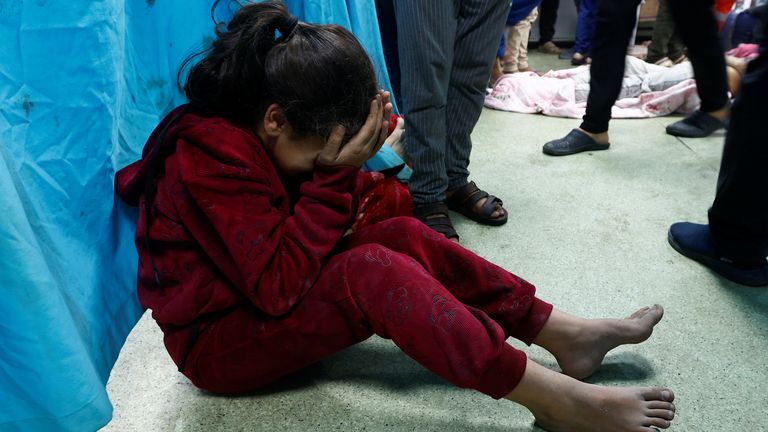
0:58
Why did US veto ceasefire resolution?
Today’s trip is intended to be part of that “eyes on the ground”, but it’s unclear whether the unstable situation on the ground will allow for actually crossing the border.
The UK’s Ambassador Dame Barbara Woodward is on the trip.
She said Britain backs “further and longer pauses” in order to get aid to Palestinians and to allow the release of the Israeli hostages.
But she’s arguing that the UK could not vote in favour of a resolution which did not “condemn the atrocities that Hamas committed against innocent Israeli civilians”.


